HALEU – High-Assay Low-Enriched Uranium
HALEU is uranium that has been enriched so that the concentration of the fissile isotope U-235 is between 5 and 19.9 percent of the mass of the fuel (uranium-235 is the main fissile isotope that produces energy during a chain reaction.)
HALEU fuel has many advantages that improve reactor performance and is required for most U.S. advanced reactors to achieve smaller designs that get more power per unit of volume. HALEU will also allow developers to optimize their systems for longer life cores, increased efficiencies and better fuel utilization.

More than 20 U.S. companies are developing advanced reactors that will change the way we think about the nuclear industry.
The majority of these designs will require a fuel that isn’t yet available at a commercial scale. These companies can’t bring their
reactors to life without HALEU!
Benefits :
- Reactors don’t need refueling as often
- HALEU reduces the volume of waste
- HALEU can be used in next generation fuel forms for the existing fleet of reactors
- New HALEU-based fuels bring improved economics and inherent safety features
- HALEU increases the amount of carbon-free electricity that can be generated
The Growing Need for HALEU and Demand for Nuclear Power
There’s a pressing need for HALEU that could force some companies to reevaluate their plans if access is limited.
The industry anticipates it may need nearly 600 metric tones of HALEU by 2030 in order to deploy new reactors to the market.
It is estimated that around 16% of all new electricity demand could be served by nuclear power by 2050, under baseline assumptions
of 20% of new demand supplied by nuclear in Green countries, 10% in Light Green, and 5% in Yellow.
This percentage of new demand would imply new nuclear generation in the amount of 4,000 TWh annually, and roughly correlate to a potential market size of ~$360 billion per year based on a tariff of $90/MWh.
- The war in Ukraine is expected to help revitalize the West’s uranium mining industry, which crashed in the 1980s due to a number of factors and has been in decline ever since, as utilities turned to cheaper foreign sources, including Russia, Kazakhstan, Canada and Australia.
- The U.S. had previously sourced highly enriched uranium fuel sources for its civilian and research programs from Russia and the former Soviet countries. The recent conflict in Ukraine has ended that supply chain of material to the States.
- The U.S. had previously down-blended enriched Eastern fuel sources to create HALEU and civilian suitable fuel for use in its civilian programs. There currently does not exist an alternative supply of HEU which the U.S. can access to replace the halted supply.
- To upgrade existing enrichment facilities within the U.S. would require a $10 billion federal investment into Urenco Group* to increase its capacity to produce suitable amount of HEU to meet its civilian nuclear requirements.
- Currently, no investment has been agreed or is scheduled for approval by congress to meet the financial commitments necessary to upgrade the country’s enrichment capability.
- Recent energy concerns have made apparent the necessity of advancing Small Modular Reactors to meet the energy security
of many countries, and to secure future sovereign energy independence. - The compact nature of SMRs requires an enriched fuel which the country will not be able to supply in the quantities required, unless significant infrastructure and political measures are swiftly taken.
* The Urenco Group is a British-German-Dutch nuclear fuel consortium operating
several uranium enrichment plants

Designed by Alt Astra | Powered by WordPress

